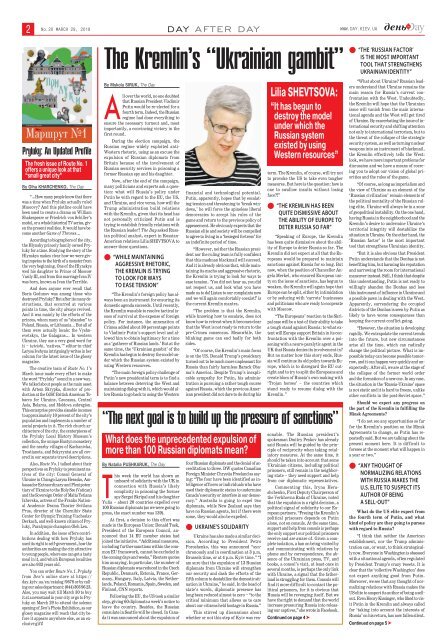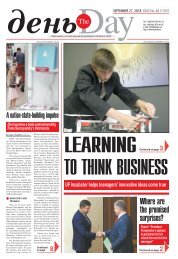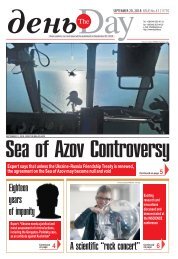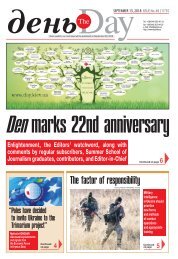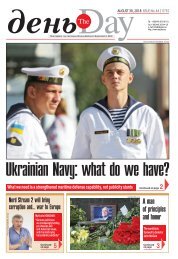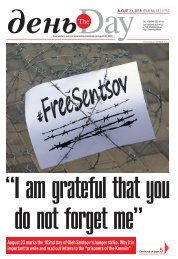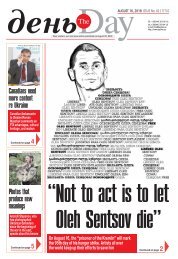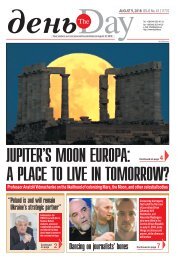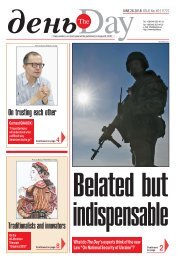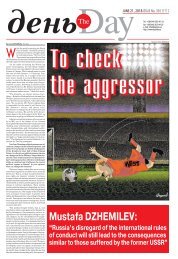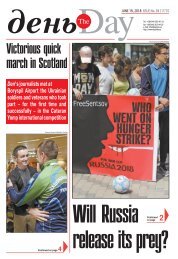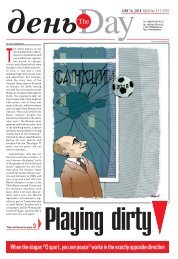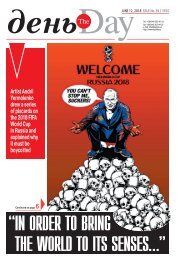Create successful ePaper yourself
Turn your PDF publications into a flip-book with our unique Google optimized e-Paper software.
2<br />
No.20 MARCH 29, 2018<br />
DAY AFTER DAY<br />
WWW.DAY.KIEV.UA<br />
Pryluky: An Updated Profile<br />
The fresh issue of Route No. 1<br />
offers a unique look at that<br />
“small great city”<br />
By Olha KHARCHENKO, The Day<br />
“...How many people know that there<br />
was a time when Pryluky actually ruled<br />
Muscovy? And this plotline could have<br />
been used to create a drama on William<br />
Shakespeare or Friedrich von Schiller’s<br />
model, or a whole historical TV series, given<br />
the present realities. It would have become<br />
another Game of Thrones...<br />
According to biographers of the city,<br />
the Hlynsky princely family owned Pryluky<br />
for a time. Studying the story of the<br />
Hlynskys makes clear how we were giving<br />
impetus to the birth of a monster from<br />
the very beginning. One of the Hlynskys<br />
wed his daughter to Prince of Moscow<br />
Vasily III, and from this marriage Ivan IV<br />
was born, known as Ivan the Terrible.<br />
And does anyone ever recall that<br />
Boris Godunov was among those who<br />
destroyed Pryluky? But after its many destructions,<br />
that occurred at various<br />
points in time, the city always revived.<br />
And it was mainly by the efforts of the<br />
princes, whom many of us “abandon” to<br />
Poland, Russia, or Lithuania... But all of<br />
them were actually locals: the Vyshnevetskys,<br />
the Galagans... In western<br />
Ukraine, they use a very good word for<br />
it – tuteishi, ‘natives,’” editor-in-chief<br />
Larysa Ivshyna intriguingly writes in her<br />
column for the latest issue of the glossy<br />
magazine.<br />
The creative team of Route No. 1’s<br />
March issue made every effort to make<br />
the word “Pryluky” sound in a new way.<br />
We talked about people as the main asset<br />
with Artem Skrypka, director of production<br />
at the OJSC British American Tobacco<br />
for Ukraine, Caucasus, Central<br />
Asia, Belarus, and Moldova subregion.<br />
This enterprise provides sizeable incomes<br />
to approximately 10 percent of the city’s<br />
population and implements a number of<br />
social projects in it. The rich church architecture<br />
of the city, the centerpieces of<br />
the Pryluky Local History Museum’s<br />
collection, the unique Hustyn monastery<br />
and the nearby villages of Kachanivka,<br />
Trostianets, and Sokyryntsi are all covered<br />
in our separate travel descriptions.<br />
Also, Route No. 1 talked about their<br />
perspectives on Pryluky to prominent natives<br />
of the city: Consul General of<br />
Ukraine in Chicago Larysa He rasko, Ambassador<br />
Extraordinary and Plenipotentiary<br />
of Ukraine to the Holy See (Vatican)<br />
and the Sovereign Order of Malta Tetiana<br />
Izhevska, actress of the Franko National<br />
Academic Drama Theater Svitlana<br />
Prus, director of the Chernihiv State<br />
Center for Olympic Training Viacheslav<br />
Derkach, and well-known citizen of Pryluky,<br />
Paralympic champion Oleh Len.<br />
In addition, the issue offers contributions<br />
dealing with how Pryluky has<br />
used its right to self-government, how the<br />
authorities are making the city attractive<br />
to young people, where one can get a tasty<br />
meal in it, and which European localities<br />
are also 933 years old.<br />
You can order Route No. 1. Pryluky<br />
from Den’s online store at https://<br />
day.kyiv.ua/en/catalog/9678 or by calling<br />
our sales department: (044) 303 96 23.<br />
Also, you may wait till March 30 to buy<br />
it at a newsstand in your city or go to Pryluky<br />
on March 29 to attend the solemn<br />
opening of Den’s Photo Exhibition, as our<br />
glossy magazine will reach that city before<br />
it appears anywhere else, as an exclusive<br />
gift!<br />
The Kremlin’s “Ukrainian gambit”<br />
By Mykola SIRUK, The Day<br />
All over the world, no one doubted<br />
that Russian President Vladimir<br />
Putin would be re-elected for a<br />
fourth term. Indeed, the Russian<br />
regime had done everything to<br />
ensure the necessary turnout and, most<br />
importantly, a convincing victory in the<br />
first round.<br />
During the election campaign, the<br />
Russian regime widely exploited anti-<br />
Western rhetoric, using as an excuse the<br />
expulsion of Russian diplomats from<br />
Britain because of the involvement of<br />
Russian security services in poisoning a<br />
former Russian spy and his daughter.<br />
Now, after the end of the campaign,<br />
many politicians and experts ask a question:<br />
what will Russia’s policy under<br />
Putin be with regard to the EU, the US,<br />
and Ukraine, and vice versa, how will the<br />
Trump administration build relations<br />
with the Kremlin, given that its head has<br />
not personally criticized Putin and is<br />
trying to establish friendly relations with<br />
the Russian leader? The Day asked Russian<br />
political analyst, expert in Russian-<br />
American relations Lilia SHEVTSOVA to<br />
answer these questions.<br />
● “WHILE MAINTAINING<br />
AGGRESSIVE RHETORIC,<br />
THE KREMLIN IS TRYING<br />
TO LOOK FOR WAYS<br />
TO EASE TENSION”<br />
“The Kremlin’s foreign policy has always<br />
been an instrument for ensuring its<br />
domestic agenda succeeds. Until recently,<br />
the Kremlin was able to resolve tactical issues<br />
of survival at the expense of foreign<br />
policy. For instance, the annexation of<br />
Crimea added about 30 percentage points<br />
to Vladimir Putin’s support level and allowed<br />
him to obtain legitimacy for a time<br />
as a ‘gatherer of Russian lands.’ But at the<br />
same time, the ‘Ukrainian gambit’ of the<br />
Kremlin has begun to destroy the model under<br />
which the Russian system existed by<br />
using Western resources.<br />
“The main foreign policy challenge of<br />
Putin’s new presidential term is to find a<br />
balance between deterring the West and<br />
maintaining dialog with it, which would allow<br />
Russia to go back to using the Western<br />
By Natalia PUSHKARUK, The Day<br />
This week the world has shown an<br />
unheard-of solidarity with the UK in<br />
connection with Russia’s likely<br />
complicity in poisoning the former<br />
spy Sergei Skripal and his daughter<br />
Yulia – about 20 countries expelled over<br />
100 Russian diplomats (as we were going to<br />
press, the exact number was 139).<br />
At first, a decision to this effect was<br />
made in the European Union: Donald Tusk,<br />
President of the European Council, announced<br />
that 14 EU member states had<br />
joined the initiative. “Additional measures,<br />
including further sanctions within the common<br />
EU framework, cannot be excluded in<br />
the coming days and weeks,” Reuters quotes<br />
him as saying. In particular, the number of<br />
Russian diplomats was reduced in the Czech<br />
Republic, Denmark, Estonia, France, Germany,<br />
Hungary, Italy, Latvia, the Netherlands,<br />
Poland, Romania, Spain, Sweden, and<br />
Finland, CNN reports.<br />
Following the EU, the US took a similar<br />
step, giving 60 diplomats a week’s notice to<br />
leave the country. Besides, the Russian<br />
consulate in Seattle will be closed. In Canada<br />
it was announced about the expulsion of<br />
financial and technological potential.<br />
Putin, apparently, hopes that by escalating<br />
tension and threatening to ‘break windows,’<br />
he will force the spineless liberal<br />
democracies to accept his rules of the<br />
game and return to the previous policy of<br />
appeasement. He obviously expects that the<br />
Russian elite and society will be compelled<br />
to agree to living in a ‘besieged fortress’ for<br />
an indefinite period of time.<br />
“However, neither the Russian president<br />
nor the ruling team is fully confident<br />
that this madman blackmail will succeed.<br />
And it is already obvious that, while maintaining<br />
its macho and aggressive rhetoric,<br />
the Kremlin is trying to look for ways to<br />
ease tension. ‘You did not hear us, you did<br />
not respect us, and look what you have<br />
made us to do! Listen to our complaints now<br />
and we will again comfortably coexist!’ is<br />
the current Kremlin mantra.<br />
“The problem is that the Kremlin,<br />
while knowing how to escalate, does not<br />
know how to retreat when it becomes clear<br />
that the West is not ready to return to the<br />
pre-Crimea consensus. Meanwhile, the<br />
blinking game can end badly for both<br />
sides.<br />
“Of course, the Kremlin’s main focus<br />
is on the US. Donald Trump’s presidency<br />
turned out to be much more unpleasant for<br />
Russia than fairly harmless Barack Obama’s<br />
America. Despite Trump’s inexplicable<br />
sympathy for Putin, his administration<br />
is pursuing a rather tough course<br />
against Russia, which the previous American<br />
president did not dare to do during his<br />
four Russian diplomats and the denial of accreditation<br />
to three. DW quotes Canadian<br />
Foreign Minister Chrystia Freeland as saying:<br />
“The four have been identified as intelligence<br />
officers or individuals who have<br />
used their diplomatic status to undermine<br />
Canada’s security or interfere in our democracy.”<br />
Australia is going to expel two<br />
diplomats, while New Zealand says they<br />
have no Russian agents, but if there were<br />
some, they would also be expelled.<br />
Lilia SHEVTSOVA:<br />
“It has begun to<br />
destroy the model<br />
under which the<br />
Russian system<br />
existed by using<br />
Western resources”<br />
term. The Kremlin, of course, will try not<br />
to provoke the US to take even tougher<br />
measures. But here is the question: how is<br />
one to swallow insults without losing<br />
face?!”<br />
● “THE KREMLIN HAS BEEN<br />
QUITE DISMISSIVE ABOUT<br />
THE ABILITY OF EUROPE TO<br />
DETER RUSSIA SO FAR”<br />
“Speaking of Europe, the Kremlin<br />
has been quite dismissive about the ability<br />
of Europe to deter Russia so far. The<br />
Kremlin did not expect at all that the Europeans<br />
would be prepared to maintain<br />
sanctions against Russia for so long. But<br />
now, when the position of Chancellor Angela<br />
Merkel, who ensured European unity<br />
on the issue of sanctions, has begun to<br />
weaken, the Kremlin will again hope that<br />
Europe can be split, either by intimidation<br />
or by seducing with ‘carrots’ businesses<br />
and politicians who are ready to cooperate<br />
with Moscow.<br />
“The Europeans’ reaction to the Skripal<br />
case will be a test of their ability to take<br />
a tough stand against Russia: to what extent<br />
will Europe support Britain in its confrontation<br />
with the Kremlin over a poisoning<br />
with a neuro-paralytic agent in the<br />
UK that Russia denies its involvement in?<br />
But no matter how this story ends, Russia<br />
will continue its old policy towards Europe,<br />
which is to disregard the EU outright<br />
and to try to split the Europeans and<br />
create blocs of Russia’s own making with<br />
‘Trojan horses’ – the countries which<br />
stand ready to resume dialog with the<br />
Kremlin.”<br />
“The next goal is to build up the pressure of sanctions”<br />
What does the unprecedented expulsion of<br />
more than 100 Russian diplomats mean?<br />
● UKRAINE’S SOLIDARITY<br />
Ukraine has also made a similar decision.<br />
According to President Petro<br />
Poroshenko, this was announced “synchronously<br />
and in coordination at 3 p.m.<br />
Brussels time, or at 4 p.m. Kyiv time.” “I<br />
am sure that the expulsion of 13 Russian<br />
diplomats from Ukraine will strengthen<br />
our security and dash the efforts of the<br />
fifth column to destabilize the domestic situation<br />
in Ukraine,” he said. In the head of<br />
state’s words, diplomatic presence has<br />
long been reduced almost to zero – “to the<br />
critical minimum that allows us to care<br />
about our citizens held hostage in Russia.”<br />
This stirred up discussions about<br />
whether or not this step of Kyiv was reasonable.<br />
The Russian president’s<br />
spokesman Dmitry Peskov has already<br />
said Russia will be guided by the principle<br />
of reciprocity when taking retaliatory<br />
measures. At the same time, it<br />
should be taken into account that some<br />
Ukrainian citizens, including political<br />
prisoners, still remain in the neighboring<br />
state – they need support and help<br />
from our diplomatic representatives.<br />
Commenting this, Iryna He ra -<br />
shchen ko, First Deputy Chairperson of<br />
the Verkhovna Rada of Ukraine, noted<br />
that the expulsion is a right decision, a<br />
political signal of solidarity to our European<br />
partners. “Freeing the Kremlin’s<br />
political prisoners depends on Putin<br />
alone, not on consuls. At the same time,<br />
support and help from consuls is perhaps<br />
the only support our political prisoners<br />
receive and are aware of. Given a complete<br />
isolation, a ban on being visited by<br />
and communicating with relatives by<br />
phone and by correspondence, the absence<br />
of the Ukrainian press, TV, and<br />
books, a consul’s visit, at least once in<br />
several months, is perhaps the only link<br />
with Ukraine, a signal that the fatherland<br />
is struggling for them. Consuls will<br />
find it more difficult to contact the political<br />
prisoners, for it is obvious that<br />
Russia will be revenging itself. But we<br />
have the right to demand that the world<br />
increase pressuring Russia into releasing<br />
our captives,” she wrote in Facebook.<br />
Continued on page 4 ➤<br />
● “THE ‘RUSSIAN FACTOR’<br />
IS THE MOST IMPORTANT<br />
TOOL THAT STRENGTHENS<br />
UKRAINIAN IDENTITY”<br />
“What about Ukraine? Russian leaders<br />
understand that Ukraine remains the<br />
main reason for Russia’s current confrontation<br />
with the West. Undoubtedly,<br />
the Kremlin will hope that the Ukrainian<br />
issue will vanish from the main international<br />
agenda and the West will get tired<br />
of Ukraine. By exacerbating the issue of international<br />
security and shifting attention<br />
not only to international terrorism, but to<br />
the threat of the collapse of the strategic<br />
security system, as well as turning nuclear<br />
weapons into an instrument of blackmail,<br />
the Kremlin effectively tells the West:<br />
look, we have more important problems for<br />
discussion and we have a means of coercing<br />
you to adopt our vision of global priorities<br />
and the rules of the game.<br />
“Of course, as long as imperialism and<br />
the view of Ukraine as an element of the<br />
‘Russian civilization’ remain elements of<br />
the political mentality of the Russian ruling<br />
elite, Ukraine will always be in a zone<br />
of geopolitical instability. On the one hand,<br />
having Russia in the neighborhood and the<br />
Kremlin’s desire to undermine Ukraine’s<br />
territorial integrity will destabilize the<br />
situation in Ukraine. On the other hand, the<br />
‘Russian factor’ is the most important<br />
tool that strengthens Ukrainian identity.<br />
“But it is also obvious that President<br />
Putin understands that the Donbas is not<br />
benefiting him, but harming his reputation<br />
and narrowing the room for international<br />
maneuver instead. Still, I think that despite<br />
this understanding, Putin is not ready to<br />
willingly abandon the Donbas and lose<br />
this instrument of influence in Ukraine and<br />
a possible pawn in dealing with the West.<br />
Apparently, surrendering the occupied<br />
districts of the Donbas is seen by Putin as<br />
likely to have worse consequences than<br />
keeping the current conflict going.<br />
“However, the situation is developing<br />
rapidly. We extrapolate the current trends<br />
into the future, but new circumstances<br />
arise all the time, which can radically<br />
change the political picture. What is impossible<br />
today can become possible tomorrow,<br />
and it can happen very quickly and unexpectedly.<br />
After all, we are at the stage of<br />
the collapse of the former world order<br />
and the formation of a new one. In any case,<br />
the situation in the ‘Russia-Ukraine’ space<br />
is not static and it is hard to freeze, unlike<br />
other conflicts in the post-Soviet space.”<br />
Should we expect any progress on<br />
the part of the Kremlin in fulfilling the<br />
Minsk Agreements?<br />
“I do not see any opportunities so far<br />
for the Kremlin’s position on the Minsk<br />
Agreements to change, as Putin has repeatedly<br />
said. But we are talking about the<br />
present moment here. It is difficult to<br />
foresee at the moment what will happen in<br />
a year or two.”<br />
● “ANY THOUGHT OF<br />
NORMALIZING RELATIONS<br />
WITH RUSSIA MAKES THE<br />
U.S. ELITE TO SUSPECT ITS<br />
AUTHOR OF BEING<br />
A SELL-OUT”<br />
What do the US elite expect from<br />
the fourth term of Putin, and what<br />
kind of policy are they going to pursue<br />
with regard to Russia?<br />
“I think that neither the American<br />
establishment, nor the Trump administration<br />
can, or want, to think strategically<br />
now. Everyone in Washington is obsessed<br />
with a situational agenda, often regulated<br />
by President Trump’s crazy tweets. It is<br />
clear that the ‘collective Washington’ does<br />
not expect anything good from Putin.<br />
Moreover, we see that any thought of normalizing<br />
relations with Russia makes the<br />
US elite to suspect its author of being a sellout.<br />
Even Henry Kissinger, who liked to visit<br />
Putin in the Kremlin and always called<br />
for ‘taking into account the interests of<br />
Russia’ on his return, has now fallen silent.<br />
Continued on page 5 ➤


